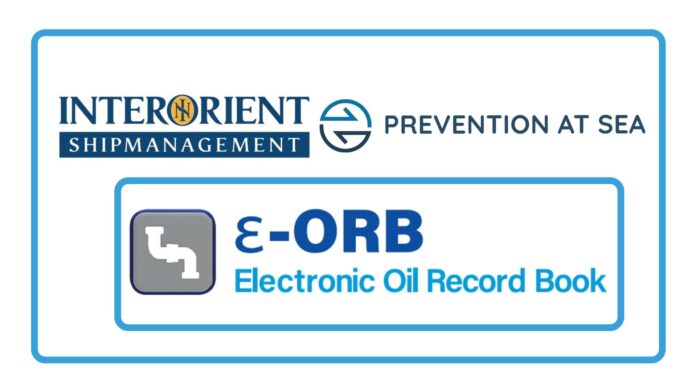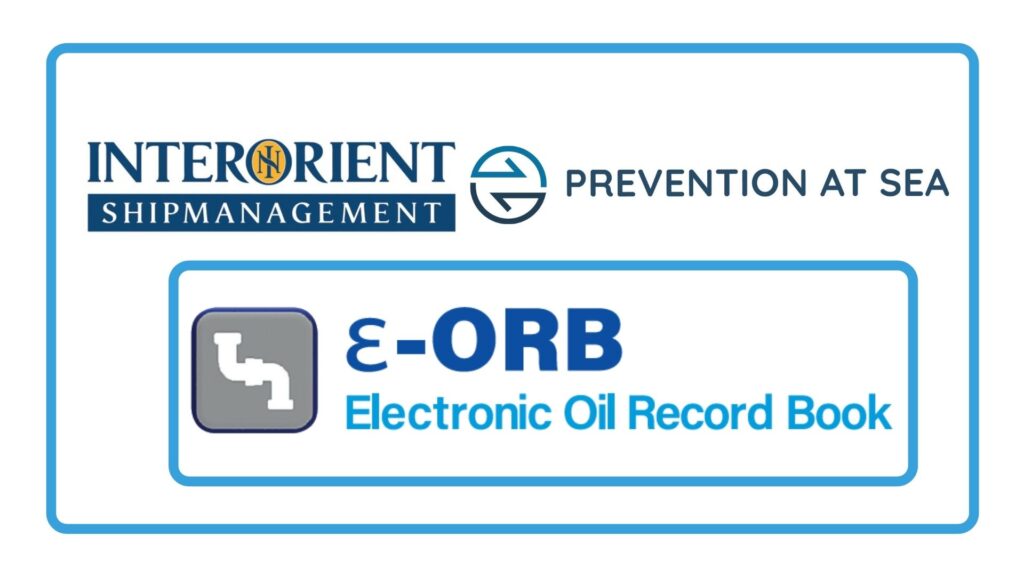
(www.MaritimeCyprus.com) Interorient Shipmanagement has decided to transition from traditional paper Oil Record Books (ORB) to using paperless, electronic ORBs through Prevention at Sea’s ɛ-ORB software application.
The decision to implement electronic recording on our entire fleet was taken to support the broader goal of more effective ship operations and to achieve the many benefits that come from the retention of electronic records, such as a reduction in the administrative burden associated with manual paperwork and reporting.
Switching to using the ε-ORB, developed by Prevention at Sea, in total replacement of traditional paper ORBs across the fleet also reinforces the transparency, credibility and traceability of vessel reporting since it prevents the falsification of log entries and the automated calculations prevent vague entries and mistakes. It also guards against potential and practical ORB inconsistencies.
Adoption of the ɛ-ORB by Interorient was driven by the fact that the system provides a plethora of vital options and useful functionalities such as the daily recording of tank soundings and total peace of mind knowing vessels maintains accurate information.
Captain Maurice Baker, Managing Director of Interorient says, “Errors occurring when maintaining a traditional oil record book can bear significant issues for a vessel. For us, the immediate benefits of the ε-ORB were obvious, and this software supports our move to yielding the benefits of greater digitalisation across our fleet. Working with Prevention at Sea in the roll-out of the ε-ORB has been a simple, cost-effective process and we would highly recommend the ε-ORB platform.”
Mr Petros Achtypis, founder and CEO of Prevention at Sea comments, “The comprehensive fleet agreement between Interorient Shipmanagement and Prevention at Sea comprises the rollout of the ε-ORB across their entire managed fleet. We are extremely proud that Interorient Shipmanagement have adopted our innovative software, demonstrating the trust between our two companies. Their use of ε-ORB will bring many benefits associated with simplifying and standardising current inefficient and time-consuming workflows for traditional ORB reporting”.
Find out more here: http://www.eorb.com.cy/
About Interorient Shipmanagement
Interorient Shipmanagement was founded in 1979 and today prides itself as being one of the leaders in quality ship management in the shipping industry with a long and successful history. The company’s infrastructure of ship management and manning agencies worldwide maintains the highest degree of operational and safety integrity over a managed fleet of more than 100 vessels with over 3,000 employees onboard and ashore. The company places great emphasis on its employees, its human capital, and enjoys a high degree of employee retention and loyalty both in its branch offices and amongst its seafarers. Their management experience includes technical, crew and commercial management of various types of vessels, including crude and product tankers, bulkers of all sizes, container vessels, general cargo and offshore support and supply boats. The company also provides a full range of newbuilding services from initial design to final delivery of vessel. Interorient Shipmanagement is an active member of all the primary industry trade associations. Through this active membership the company is able to be proactive in respect to regulatory developments resulting in cost-effective compliance for ship owners.
About Prevention at Sea Ltd
Prevention at Sea is an ISO 9001 maritime technology and marine risk prevention firm, certified by Lloyd's Register, built on a safety culture and risk prevention foundations. The company was born to serve the maritime industry by preventing the negatives and promoting the positives. Prevention at Sea clients benefit from their diversified maritime services and innovative software products which ensure paperless functionalities, high calibre and fleet performance optimisation, effective treatment of marine operational risks, prevention of ‘human factor’ errors and compliance with regulations, by allowing the maritime business environment to thrive.













